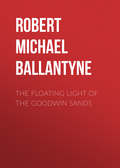
Robert Michael Ballantyne
The Pirate City: An Algerine Tale
Arraying himself in the skin of the wild boar, he attempted to cover himself with an Arab burnous, but, do what he could, he found it impossible to draw the hood over him in such a way as to conceal the head of the boar, and after his recent escapade with the guard, he felt that it was not safe to venture forth again uncovered. He therefore resolved to keep the boar’s head exposed, and to venture boldly forth, despite the attention it was sure to attract.
To his great relief Rais himself came in just as he was about to start, and after relating his adventure, that worthy suggested that he should join half a dozen of the French consul’s own servants, who were about to set out for the scene of festivities.
Agreeing to this plan, he passed through the streets without attracting much more attention than did his somewhat wildly-habited companions, and soon reached the French consul’s residence, which was not more than half a mile beyond the southern gate of the city.
The blaze of light and buzz of musical noise that reigned here immediately swallowed them up, so that Ted felt himself, for the time at least, to be safe. His grotesque figure did indeed attract some attention at first, for he was an exceeding tall and sturdy boar, but there were so many other notabilities from the forest and desert around him that he quickly sank into comparative insignificance.
Some of the other creatures referred to gave him a little uneasiness by their curiosity and desire to claim acquaintance, if not kindred, with him, but by humouring some, frightening others, running away from several, and tumbling a few into the bushes, he managed to push through the crowd of domestics unrecognised, and made his way into the outer lobby of the mansion.
Here, seated under the shadow of a Moorish arch way, drinking lemonade, in default, as he said, of better tipple, Ted resolved to bide his time, but his time seemed rather long of coming. He therefore boldly entered the magnificent skiffa in search of Colonel Langley.
His appearance was greeted with a shout of delight by several children who were present, and the French consul, willing to amuse them, went up, and, shaking hands with the boar, begged of him to join in the dance.
Poor Ted would have given anything to have known what was said to him, but, being utterly ignorant of French, shook his head and bowed with an air of profound respect, which piece of politeness caused his short and rather ill-fitting tail to stick straight up in the air for a moment, and drew roars of laughter from the company.
“Dansez, dansez-vous,” said the Frenchman, with more emphasis.
“Och! it’s that ye want, is it?” said Ted, much relieved; “sure I’ll do it with all the pleasure in life.—Clear the deck, boys!”
And without more ado the lively tar began to whistle a sailor’s hornpipe, and to dance the same with an amount of vigorous dexterity that had in former years made him the favourite of the forecastle.
The surprise soon merged into admiration, for our hero danced exceedingly well, and all eyes were attracted to him. Among others the British consul came forward to look on with much interest and curiosity, for his ear was perhaps the only one present to which the tune whistled was familiar.
Dancing close up to him, Ted Flaggan suddenly slipped, and, staggering as if about to fall, flung his arm over the consul’s shoulder.
“Take care!” said the latter, catching him.
“Och!” gasped Ted, sinking down and almost dragging the other after him, “spake to me av ye love me.”
Amazed by this tender appeal, and suddenly suspecting the personality of the boar, the consul bent down while the rest of the onlookers crowded round,—and said in a low voice—
“Why, Flag—”
“Whist! whist! blood an thunder! it’ll rain scimitars an’ grape-shot av ye say a word! Mate me in the gardin’ dear, under the palm.”
This was said in the midst of a writhing and growling which would have done credit to a lunatic boar, if such there were!
“Not hurt, I hope?” said the French consul, coming forward.
“Not at all,” replied Colonel Langley, rising with a smile, “the fellow is one of my domestics, and has almost over-acted his part. He will be all right in a minute if some one will be kind enough to fetch him a glass of water—”
“An’ brandy, ochone!” exclaimed the boar, with another tremendous growl, that again sent the children into shouts of delight.
The brandy and water was brought, and Ted making a polite bow to the company, passed down the room with a slight tremor of the hornpipe in his legs, and a faint trill of the tune on his lips, both of which melted gradually into a boarish grunt and roll as he reached the lobby and passed out into the garden.
Hastening to a stately date-palm, of which there happened to be only one specimen in the garden of the French residence, the heated seaman pushed off his head, wiped his brow, drank the brandy and water, and threw away the tumbler, after which he sat down on a root, mechanically pulled out his pipe, and was in the act of filling it when Colonel Langley came hurriedly forwards.
“Why, Flaggan,” he asked, “what’s wrong? for something must be, to induce your strange conduct.”
“Lord Exmouth, sir,” replied Ted, rising up with an air of dignified importance which the elevated snout of the boar tended sadly to impair, “is in the offing with fifty sail o’ the line, more or less, comin’ to blow this precious city into the middle of next week.”
“Come, Flaggan, let us have it without jesting,” said the consul gravely.
Thereupon Ted related in as serious a tone as it was possible for him to assume all that had been told by the Padre Giovanni.
“Our position will indeed be critical if this be true,” muttered the consul, with a look of anxiety. “Omar is a man who fears nothing, and has unbounded faith in his men and fortifications. Moreover, he is utterly regardless of consequences, and has no mercy when once roused. My poor defenceless wife and children!—if—”
“You may depend upon me, sir,” said Ted, seeing that he hesitated; “I’ll stick to ’em, I will, through—”
“I have no doubt of that, my man,” interrupted the consul, with a sad smile, “but your aid in this case will be useless. The fact is that the preservation of your life will be a more difficult matter for me to accomplish than my own. If Lord Exmouth really arrives and proceeds to extremities, I and my family will be in the greatest peril from these irate corsairs, but you, my poor fellow, are doomed whatever happens, seeing that you have laid violent hands on the Turkish guard of the gates.”
“Sure, an’ small blame to me,” said Ted.
“I do not blame you, but the Turks will, and they will do more,—they will strangle you for a certainty the moment they get hold of you, and no power that I possess can save you, so that your only chance lies in making your escape from the city, either by land or sea.”
“An’ that won’t be aisy, sur,” said the seaman, with a perplexed look.
“Indeed it will not. You may be sure that the Turks are even now searching for you, and as they know that I am here, and that you belong to my household—”
“By your lave,” said Ted suddenly, “it sames to me that it’s time for Ted Flaggan to look after his owld bones. I’m grateful to ’ee, sur.—Good-night.”
He pulled his boar-head down without awaiting a reply, and went hastily off in the direction of a small outhouse where Rais Ali was enjoying himself amid a circle of the French consul’s domestics.
Dashing forward, he seized his friend by the arm and dragged him out by main force, to the amusement of the domestics, who thought it was a practical jest.
“Arrah! don’t stare like that, but come along wid ye,” said Ted, hasting to a neighbouring thicket, into the very heart of which he penetrated before halting.
“What be go wrong?” exclaimed Rais.
“They’re after me, lad. Don’t waste time spaikin’. You’ve got your burnous here, haven’t ye?”
“Yis!”
“Go, fetch it, an’ sharp’s the word.”
Flaggan’s tone and actions were such as to instil a spirit of prompt unquestioning obedience into his friend, who instantly went off; and in a few seconds, (which seemed years to Ted), returned with his burnous.
While the seaman quickly but quietly divested himself of the boar-skin, and put on the burnous with the hood well drawn over his face, he related to his friend the incident at the gate, without, however, mentioning the true cause of his behaviour.
“An’ wat for you go be do now?” asked Rais Ali anxiously.
“To make me escape, sure,” said Ted, holding the head of his cudgel close up to his friend’s nose; “across the mountains or over the say, by hook or crook, or through the air, escape I will somehow, even though I should have to jump out at me mouth an’ lave me body behind me, for depind upon it that all the Turks an’ Moors an’ boors an’ naigers in the Pirates’ Nest ain’t able to take Ted Flaggan alive!”
“Unposs’ble!” exclaimed Rais decidedly.
“I manes to try, anyhow,” returned Ted; “so give us your flipper, owld boy; I’ve a sort o’ sneakin’ regard for ’ee, tho’ ye haven’t much to boast of in the way o’ pluck.”
“Unposs’ble!” again ejaculated Rais Ali, with greater decision than before.
“Well, good-bye to ’ee—I’m off.”
“Stay. I will save you.”
“How?” asked Ted, pausing with some impatience.
“Stay. Hold. Stop,” cried, the Moor, seizing the arm of his friend. “You be mad. Unposs’ble I say?—no, yes, poss’ble anuf for you ’scape without your body. But me save bof. Me knows hole in de rocks; come take you dere,”—here the Moor became emphatic, and lowered his voice to a whisper,—“no boddy do knows it. All dead w’at know’d it vonce. Me was a—what you call?—pirate vonce. Hah! nebber mind, come ’long. Queek, no time for d’liberazhun.”
“Git along then, old feller,” said Flaggan, thrusting his companion through the thicket very unceremoniously. “Don’t palaver so much, but take the helm; an’ wotiver ye do, clap on all sail—ivery stitch you can carry—for the case is desprit.”
Rais Ali did “clap on all sail,” steered his friend through the brightly-lighted grounds and laughing throng of revellers, through numerous lanes between hedges of aloes and prickly pear, over the Sahel hills, and away to the northward, until they reached the neighbourhood of Pointe Pescade, which lay about three and a half miles on the other side of the town.
“It’s a purty big raigion hereaway,” said Flaggan, during a brief halt to recover breath; “why shouldn’t I steer for the Great Zahairy, an’ live wi’ the Bedooin Arabs? I s’pose it’s becase they’ll always be doin’ somethin’ or other that they’ve got the name.”
“’Cause they’d robb an’ kill you,” replied Rais.
“Umph!” ejaculated Ted, as they descended to the bold rocky coast, where the celebrated pirate of old was wont to mount guard over the Mediterranean.
“Betterer for you trust to de sea,” said Rais.
“True for ye, boy—seein’ that I’m a say-farin’ man,” returned Ted.
Proceeding cautiously down a wild and almost invisible pathway among the cliffs, Rais Ali reached the base at a part where the sea ran under the overhanging rocks. Stepping into a pool which looked black and deep, but which was only a few inches at the edge, he waded slowly into the interior of a cavern, the extremity of which was quite dry. It was dark as Erebus, but flint and steel soon produced a light.
“There vas vonce a torch here,” said Rais, looking about hastily, while the vault above was lighted for a few seconds by the bunch of dry grass which he had brought with him, “but it long since me be—ah, here it is; dis am de torch.”
He lighted it, and showed his friend the form and size of the cave, reiterated that it was known to no one but himself—at least so he thought—advised him to remain close all day and keep a good look-out seaward at night, promised to return with food the following evening, and finally left him to his meditations.
Chapter Twenty Four.
The Dark Clouds begin to thicken—A Rescue attempted—Master Jim plays a Conspicuous Part
In the course of a few days the rumour reached Algiers that England was in right earnest about sending a fleet to bombard the city, and at the same time Colonel Langley learned, through information privately conveyed to him, that the report of Padre Giovanni was to some extent incorrect. The old man had misunderstood the message given to him, and represented the fleet as being in the offing, whereas it had not at that time left England.
The caution, however, was useful, inasmuch as it put the British consul on his guard.
It was at the end of one of the Mohammedan festivals when the news reached the Dey’s ears. He was engaged at the time in celebrating the festival, surrounded by his courtiers and those of the consuls who chanced to be in favour. The tribute due by Denmark and Spain not having been paid, their respective representatives were not present, and the Dey was debating in his mind the propriety of sending them to work in irons with the slaves.
Among other entertainments there was a wrestling match about to take place in the skiffa of the palace. Before proceeding to the skiffa, Omar had shown his guests his menagerie, which contained some remarkably fine specimens of the black-maned lion, with a variety of panthers, jackals, monkeys, and other animals. This was rather a trying ordeal for the nerves of the timid, because the animals were not in cages, being merely fastened by ropes to rings in the walls—all save one, called the “Spaniard,” who was exhibited as the roarer of the tribe, and had to be stirred up to partial madness occasionally to show his powers of lung; he was therefore prudently kept in a wooden cage.
Entering the skiffa, the Dey took his seat on a throne, and ordered the wrestlers to begin.
In the centre of the court was a pile of sawdust, surmounted by a flag. At a given signal two naked and well-oiled Moors of magnificent proportions rushed into the court and scattered the sawdust on the floor, after which they seized each other round their waists, and began an exciting struggle, which ended after a few minutes in one—of them being thrown. Another champion then came forward, and the scene was repeated several times, until one came off the conqueror, and obtained from the Dey a purse of gold as his reward. The unsuccessful athletes were consoled by having a handful of silver thrown into the arena to be scrambled for. It seemed as if more enjoyment was got by the spectators from the scramble than from the previous combats. After this a quantity of food was thrown to the athletes, for which another scramble ensued.
In the midst of this scene an officer of the palace was observed to whisper in the ear of the Dey, who rose immediately and left the skiffa, bringing the amusements to an abrupt close.
Thus was sounded the first clap of the thunder storm which was about to descend on the city.
The effect of it was great, and, to some of the actors in our tale, most important.
All the executions of slaves which had been ordered to take place were countermanded, except in the cases of one or two who had rendered themselves particularly obnoxious, and a few others who were unfit for labour. This was done because Omar determined to put forth all his available power to render the fortifications of the place as strong as possible. All the slaves were therefore set to work on them, but those who had been under sentence of death were kept from too great a rebound of spirits at the reprieve, by being told that the moment the work was finished their respective punishments should be inflicted. Our poor friend Mariano was thus assailed by the horrible thought, while working at the blocks of concrete, which he mixed from morning till night, that in one such block he should ere long find a living tomb.
We need scarcely add that the thought drove him to desperation; but, poor fellow, he had by that time learned that the violence of despair could achieve nothing in the case of one on whose limbs heavy irons were riveted, and whose frame was beginning to break down under the protracted and repeated tortures to which it had been exposed.
Ah! how many wretched men had learned the same bitter lesson in the same accursed city in days gone by—whose groans and cries, though unrecorded by the pen of man, have certainly been inscribed in the book of God’s remembrance, and shall yet be brought into a brighter light than that of terrestrial day!
Omar Dey was a man of energy and decision. The instant it became known to him that England was at last stirred up to resent the insults which had been heaped upon her and other nations by the Algerines, he set about making preparations for defence on the vastest possible scale.
It was a sight worth seeing—though we cannot afford space to describe it in detail—the hundreds of camels, horses, mules, and donkeys that trooped daily into the city with provisions and matériel of every kind; the thousands of Arabs who by command flocked in from the surrounding country to defend the city, and the hundreds of Christian captives who, collected from the quarries, as well as from the fields, gardens, and stables of their respective owners, were made to swarm like bees upon the already formidable walls.
Some of the slaves were fettered; most of them, having been tamed, were free. Some were strong, others were weak, not a few were dying, but all were made to work and toil day and night, with just sufficient rest to enable them to resume labour each morning. It was a woeful sight! A sight which for centuries had been before the eyes of European statesmen, but European statesmen had preferred that European peoples should go on cutting each other’s throats, and increasing their national debts, rather than use their power and wealth to set their captive brethren free; and it was not until the nineteenth century that England, the great redresser of wrongs, put forth her strong hand to crush the Pirate City.
While these busy preparations were going on, a terrible gale arose, which did a good deal of damage to the harbour and shipping of Algiers, and, among other peculiar side-influences, inscribed the name of the French consul in the Dey’s black book. Indeed, nearly all the consuls had their place in that book now, for Omar had been chafed by the cloud of little worries that surrounded him, not having been long enough on the throne to regard such with statesman-like equanimity.
The gale referred to had the effect of driving several Moorish vessels close under the walls of the town, just in front of the mosque Djama Djedid. During its progress a French privateer, (in other words, a licensed pirate!) which chanced to be in port at the time, unintentionally fouled a Moorish vessel, and sank it.
Next day a divan was held, at which Omar demanded payment of the French consul. Not feeling himself bound to pay for the misdeeds of a privateer, the consul refused, whereupon the privateer was seized, and all her crew sent in chains to work at the fortifications.
It chanced, about the same time, that news came of an English frigate having seized an Algerine vessel, and carried her off to Gibraltar. This sent Colonel Langley still deeper into Omar’s black book, so that he felt himself and family to be in great danger of being also put in chains and sent to the Marina, if not worse. He therefore hastened the secret packing of his valuables, intending to avail himself of the first opportunity that should offer of leaving the city.
Such an opportunity soon occurred, at least so thought the consul, in the arrival of the “Prometheus,” a British war-vessel of 18 guns, but Colonel Langley found, as many have discovered before him, that “there is many a slip ’twixt the cup and the lip,” for the Dey suddenly took a high position, and absolutely refused to allow the British consul to depart.
Captain Dashwood, the commander of the “Prometheus,” on his first interview with the Dey, saw that there was no chance whatever of getting off the consul by fair means, for Omar treated him with studied hauteur and insolence.
“I know perfectly well,” said he, at the conclusion of the conference, “that your fleet, which report tells me has already left England, is destined for Algiers. Is it not so?”
“I have no official information, your highness,” replied Captain Dashwood. “If you have received such news, you know as much as I do, and probably from the same source—the public prints.”
“From whence I have it is a matter of no moment,” returned the Dey, as he abruptly closed the conference.
Immediately after, Captain Dashwood informed the consul of his intention of sending a boat ashore next morning, with the ostensible motive of making final proposals to the Dey, but really for the purpose of carrying out his plans, which he related in detail.
Accordingly, next morning, the captain proceeded to the palace, and kept the Dey in complimentary converse as long as was possible with a man of such brusque and impatient temperament.
While thus engaged, several of the men and midshipmen of the “Prometheus” proceeded to the consul’s house. They did so in separate detachments, and some of them returned once or twice to the boat, as if for some small things that had been forgotten, thus confusing the guards as to the numbers of those who had landed.
When Captain Dashwood again returned to his boat there were two more midshipmen in it than the number that had left his ship—one being the consul’s wife, the other his daughter Agnes! Master Jim, however, had been left behind, owing to the arrangements not having been sufficient to meet his requirements. Poor Mrs Langley had left him with agonised self-reproach, on being assured that he should be fetched off on the morrow. Colonel Langley was of course obliged to remain with him.
When the morrow came another boat was sent ashore with baskets for provisions. One of these baskets was taken to the consul’s house. It was in charge of the surgeon of the ship, as Master Jim required the services of a professional gentleman on the occasion.
All went well at first. The boat was manned by several men and midshipmen, who went innocently to market to purchase provisions. The surgeon, a remarkably cool and self-possessed individual, went to the consul’s house, with a Jack-tar—equally cool and self-possessed—carrying the basket.
“Now then, let’s see how smartly we can do it,” said the surgeon, on entering Colonel Langley’s nursery. “Is your child tractable?”
“Very much the reverse,” replied the Colonel, with a smile.
“Umph! can’t be helped.—Set down the basket, my man, and come and hold him.”
Now the Zaharian Zubby, not having been let into the secret of the mysterious proceedings that followed, became a source of unexpected danger and annoyance to the surgeon and his friends. She watched the former with some interest, while he mixed a small powder in the family medicine-glass, and when he advanced with it to Master Jim, her large eyes dilated so that the amount of white formed an absolutely appalling contrast with her ebony visage. But when she saw Master Jim decline the draught with his wonted decision of character, thereby rendering it necessary for the nautical man to put powerful restraint on his struggling limbs, and to hold his nose while the surgeon forced open his mouth and poured the contents of the family glass down his throat, and when, in addition to all this, she beheld Colonel Langley standing calmly by with an air of comparative indifference while this hideous cruelty was being practised on his son and heir, her warm heart could stand no more. Uttering a series of wild shrieks, she ran at the nautical man, scored his face down with her ten fingers, seized the choking Jim in her arms, and thrust her fore-finger down his little throat with the humane view of enabling him to part with the nauseous draught which he had been compelled to swallow.
Master Jim had convulsed himself twice, and had actually got rid of a little of the draught, before the surgeon could recover him from the irate negress.
“I hope he hasn’t lost much of it,” remarked the surgeon, looking anxiously at the howling boy as he held him fast. “I brought only one dose of the drug, but we shall see in a few minutes.—Do stop the noise of that screeching imp of blackness,” he added, turning a look of anger on Zubby, whose grief was, like her mirth, obstreperous.
“I wish as some ’un had pared her nails afore I comed here,” growled the nautical man.
“Hush, Zubby,” said Colonel Langley, taking the girl kindly by the arm; “we are doing Jim no harm; you’ll bring the janissaries in to see who is being murdered if you go on so—hush!”
But Zubby would not hush; the Colonel therefore called his black cook and handed her over to him—who, being a fellow-countryman, and knowing what a Zaharian frame could endure, carried her into an adjoining room and quietly choked her.
“He’s going—all right,” said the surgeon, with a look and nod of satisfaction, as the child, lying in the nautical man’s arms, dropt suddenly into a profound slumber.
“Now, we will pack him.—Stay, has he a cloak or shawl of any kind?” said the surgeon, looking round.
“Zubby alone knows where his mysterious wardrobe is to be found,” replied the Colonel.
“Then let the creature find it,” cried the surgeon impatiently; “we have no time to lose.”
Zubby was brought back and told to wrap her treasure in something warm, which she willingly did, under the impression that she was about to be ordered to take him out for a walk, but the tears which still bedimmed her eyes, coupled with agitation, caused her to perform her wonted duty clumsily, and to stick a variety of pins in various unnecessary places. She was then sent to the kitchen with some trivial message to the cook.
While she was away, Master Jim was packed in the bottom of the vegetable basket, and a quantity of cabbages, cauliflowers, etcetera, were placed above him. The basket was given to the nautical man to carry. Then the surgeon and the consul went out arm-in-arm, followed by two midshipmen, who were in attendance in the hall. Robinson—so the nautical man was named—brought up the rear.
They proceeded along the street Bab-el-Oued for some distance, and then, passing the mosque near the slave-market, descended the street that led to the Marina, and the place where the boat of the “Prometheus” lay in waiting.
The consul and surgeon affected to talk and laugh lightly as they approached the gate, and were permitted to pass, the guard supposing, no doubt, that the British consul was exercising his wonted civility in conducting his friends down to their boat. But fate, in the form of Zubby, was unfavourable to them. Either that loving damsel’s finger had been more effective than was at first supposed, or the pins were operating with unwonted pungency, but certain it is, that just as Mr Robinson was passing under the gateway, Master Jim awoke from his profound slumber. Feeling, although not naturally dyspeptic, that the cabbages weighed heavy on his stomach, he set up such a howl, and struck out so violently, that the lid of the basket was forced up, and sundry vegetables rolled before the eyes of the astonished Turks.
Of course Master Jim and his bearer were taken prisoners, but the evil did not stop here, for the officer of the guard at once ordered the arrest of the consul himself, as well as the surgeon, the midshipmen, and the boat’s crew of the “Prometheus,” and the whole were thrust into the dungeons of the common prison—the consul, by special order of the Dey, being loaded with iron fetters.
The dismay of poor Mrs Langley and Agnes when they heard of the fate of the consul and his child may be imagined. It was however mitigated in some degree when, next morning, a boat came off to the “Prometheus” containing Master Jim himself, in charge of the faithful Zubby!
Whether it was that Omar deemed the child a useless encumbrance or a valueless article, or was visited by one of those touches of compunction which are well-known to assail at times the breasts of even the worst of pirates, we cannot tell; but no such clemency was extended to Jim’s father. The Dey positively refused either to give him up or to promise his personal safety, nor would he listen to a word respecting the officers and men whom he had seized.
This was the news with which Captain Dashwood left Algiers, and which, some days later, he delivered to Lord Exmouth, when he met the British fleet on its way to the city, with the view of bringing the pirates to their senses.







